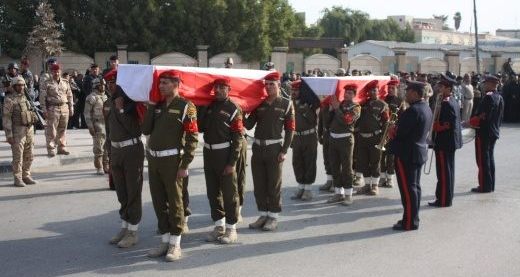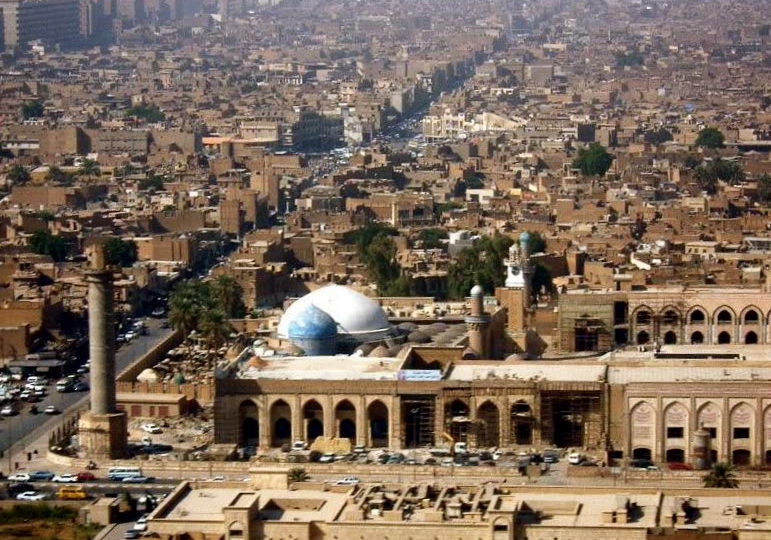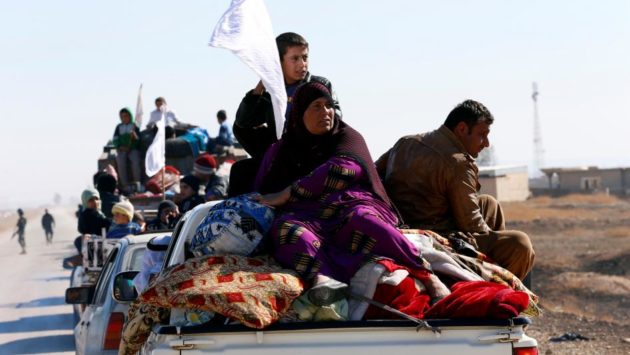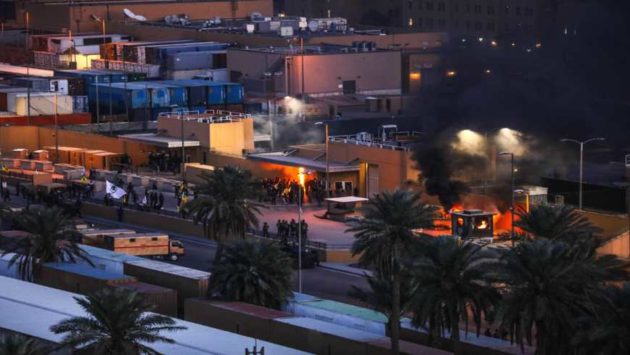WHAT DOES THE FUTURE HOLD FOR IRAQ?
WHAT DOES THE FUTURE HOLD FOR IRAQ?
The mainstream, international press is now focused on the Shi’a Prime Minister, Nouri al-Maliki’s threats to arrest the Sunni Vice President Tariq al-Hashemi for being a terrorist. Unable to understand Iraqis, except as divided into Sunni, Shi’a, and Kurdish factions, the media has ignored a story that reveals the power of ordinary Iraqis to shape a new future for their nation. During Arbaeen, the Shi’a holy day that was observed on January 5th, a suicide bomber killed 47 religious pilgrims in Batha, in Dhi Qar governorate in southern Iraq. Two army officers, Lieutenant Nazhan Faleh al-Jabouri and Deputy Sergeant Ali Ahmad al-Sabi, tackled the terrorist moments before he detonated his bomb. They died in selfless acts that prevented dozens more deaths. These heroes were not from the South. They were not Shi’a. Nazhan was a Sunni from Kirkuk and Ali was a Sunni from Diyala. Neither of them thought of religion or ethnicity when they acted. They were Iraqis! Nazhan’s mother appeared on television to say she was proud that her son had died for Iraq. Ali’s father told the press, “Myself, Ali and my tribe, we have all sacrificed for this country, just to prove that there is no difference between Shi’ites and Sunnis.” The Iraqi people agree. Thousands attended Nazhan’s funeral in Kirkuk; in Batha, a street will be named in honor of Nazhan and Ali.

And this was not an isolated incident. Arab Sunni tribes living between Baghdad and the middle Euphrates organized young men to protect Shi’a pilgrims traveling to Karbala to commemorate the 680 AD slaying of Imam Hussein, one of Shi’a Islam’s most revered figures. One Sunni man set up a large tent to provide free medical assistance for the pilgrims. The difference between what happens on the streets of Iraq and the discourse promoted by politicians is something the U.S. is largely responsible for. From the earliest days of the occupation the U.S. administration used names like “Sunni Triangle,” which was never how Iraqis thought of the provinces west and northwest of Baghdad. The U.S. coined the term to imply that if resistance was growing in the region, it was because the people were Sunni. When resistance developed in the south, you heard it was because Shi’a groups were supported by Iran. These sectarian labels disguised the reality that many Iraqis, in many places, resisted the occupation because of the humiliation, and violation of basic rights, the Iraqi people (except in the KRG) experienced at the hands of U.S. troops. Torture of prisoners in Abu Ghraib, the massacre of civilians in Haditha, the attacks on Christians in the Dora neighborhood of Baghdad, and the siege of Fallujah were Iraqis’ daily experience of occupation. This brutal reality fueled resistance and as resistance grew, the Iraqi people were collectively punished in the bombing of Najaf, Sadr City, and Mosul. Before the 2003 U.S. invasion no one ever asked who was Sunni, who was Shi’a. Many Shi’as and Sunnis, Arabs and Kurds intermarried. There were also Christians, Turkmen, Yazidis, and Assyrians living peacefully together. They were all challenged by a bloody dictatorship that stifled their freedom. Still, Iraqis had many identities. Depending upon the circumstances, you might think of yourself as a worker, a student, a professional, a poet, an athlete, a resident of Ramadi, or someone whose grandparents came from Basrah. Sect or ethnicity was only one part of your identity. After Saddam was overthrown, the U.S. structured the Governing Council that held power from July 2003 to June 2004 along totally sectarian lines. The Council included 13 Shi’ites, 5 Sunnis, 5 Kurds (who were also Sunnis), 1 Turkman and 1 Assyrian. This did not at all reflect how Iraqis viewed their world. In the battle of Fallujah in 2004, Shi’a followers of Muqtada al–Sadr fought against the occupation in the majority Sunni city because sectarian divisions did not yet pervade society. During the most difficult times Iraqis helped one another, sharing food and providing shelter in their houses to others regardless of religion or ethnicity. When the occupation began, al-Qaeda was not an actor in Iraq. But as Iraq became a battlefield, her borders were opened and extremists from other parts of the region came into the country. Al-Qaeda began its terrorist campaign. As the sectarian conflict that the occupation created deepened, al-Qaeda exploited the situation, accusing Shi’a Iraqis of being either supporters of the occupation or allies of Iran. As al-Qaeda used these lies to build its base, the sectarian political parties formed militias. Fighting and violence rose to unprecedented levels that many called a civil war. But the ideology of killing one another, over religion, culture or ethnicity, is NOT an Iraqi ideology. Truly this violence was a crime against the Iraqi people that was the result of the policies of the occupation, compounded by the opportunism of al-Qaeda and the militias of “political Islam.” As the years of occupation dragged on, ethnic and religious labels became the only way that people and regions were described. The feeling that “WE ARE ALL IRAQI” was too dangerous for the occupiers to permit. Their principle interest was to create a political narrative that justified the U.S. troops remaining in Iraq. Both the U.S. occupiers and the al-Qaeda invaders promoted the idea that Iraq was fighting a civil war. Tragically, by 2006, sectarian conflict was a reality. Certainly, the U.S. and the United Nations needed to insure representation for all Iraqis, but why wasn’t this representation geographic? Each governorate could have had representatives in proportion to its population. Instead, the U.S. enforced sectarian and ethnic “power sharing.” The principal beneficiaries of this system were the political parties that adopted “political Islam” – the parties that took on a sectarian identity. These parties formed militias. These parties received significant funding to establish media outlets that further reinforced sectarian analysis. These parties were empowered to rule Iraq and they imposed sectarian divisions on virtually every political and administrative institution. So Iraq has a Shi’a Prime Minister, a Kurdish President, and a Sunni Vice President. The current system only exploits and deepens conflict. Iraqi people now see sectarian divisions where they did not before. Once sectarianism has taken hold in Iraq, how does the nation overcome this destructive and divisive scenario? Iraqis have had their opportunity to be free from dictatorship stolen from them twice: first, when Saddam was replaced with the U.S. occupation, which Iraqis paid for in blood for nearly nine years; second, by the sectarian strife that this occupation brought to Iraq. Now, Iraqis feel their celebration of the end of the occupation is also stolen, because they are left with a fragile sectarian political regime that was created by the occupation, is recognized as legitimate by the international community, but does not serve the Iraqi people. It is not sustainable! Iraq needs to see major change that puts choice squarely in the hands of Iraqi citizens. That might be achieved by early elections, run by Iraqis, with support from a reliable international partner like the EU to provide technical assistance to the Iraqi judiciary and electoral bodies. Iraqis want a peaceful, democratic, civic state. They want transparency and an end to corruption in government and business. They struggle for it daily. The government must provide basic services – water, electricity, education and healthcare – and it must ensure security. These are national demands that all Iraqis agree on. Iraqi civil society organizations and activists have been working tirelessly to dismantle the sectarian scenario. These activists have already had significant success. When politicians refused to form a government in 2010, standing behind the legal deception of an “indefinite open session,” civil society activists went to court and had the open session declared illegal. Activists have campaigned for civic freedoms, demanding freedom of assembly, while striking down restrictions on women’s dress and attempts to shut down bars and clubs. They forced reform of the law on NGOs (nongovernmental organizations) so that Iraqis could organize, free from interference by politicians or the government. Today, major coalitions of Iraqi NGOs are challenging laws that restrict the freedom of the press and planning a yearlong campaign to promote civic peace. While Iraqi government officials battle each other, people in all parts of Iraq continue to demand change. From Sulaimaniya and Mosul in the north, from Basrah in the south, from Tahrir Square in Baghdad, and from the many other cities that took part in the “Iraqi Spring” the calls persist: no return to dictatorship, stop using religion as a political tool, respect independent civil society in Iraq, and build a civic state that respects the human rights of all Iraqi citizens. That is surely what would honor the sacrifices of Nazhan and Ali. As one resident of Sadr City said of the two army officers’ courageous defense of their fellow Iraqis, “This is a message for all the bad politicians that they cannot divide Iraq or take advantage of sectarianism to divide it.” Written by Iraqi Civil Society Solidarity Initiative’s members: Terry Kay Rockefeller, September 11th Families for Peaceful Tomorrows and Ismaeel Dawood, Un Ponte Per …



